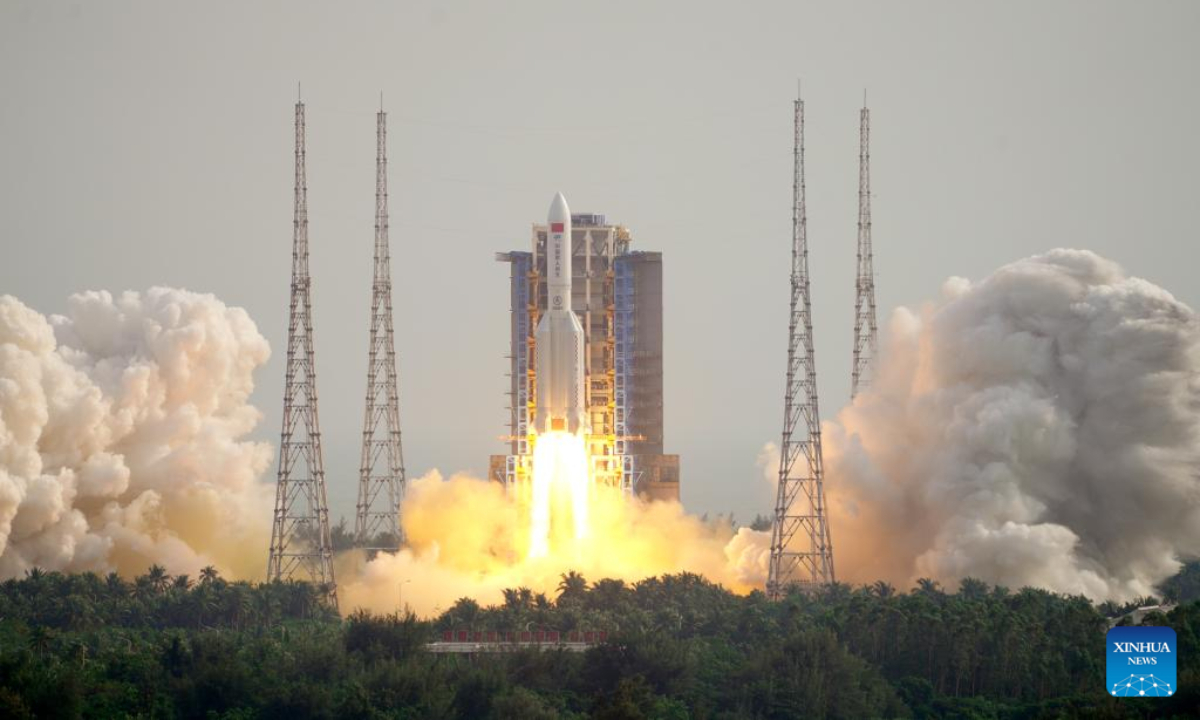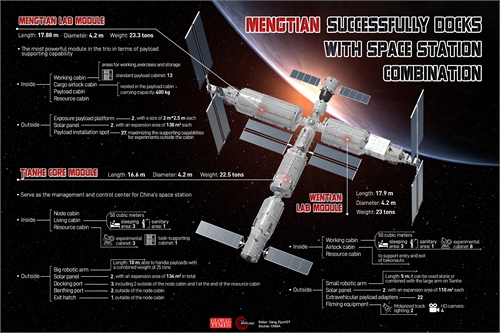Rocket debris from Mengtian launch falling on Earth an intl norm, chance of causing harm extremely low: Chinese FM

The Long March-5B Y4 carrier rocket, carrying the space lab module Mengtian, blasts off from the Wenchang Spacecraft Launch Site in south China's Hainan Province, Oct 31, 2022. Photo:Xinhua
With many across the world still immersed in the excitement over the epic launch of the third and final part of China's Space Station - the Mengtian lab module - some in the West have once again begun their hyping of the launch vehicle's falling debris, claiming it is falling back to Earth "uncontrollably."
Responding to such hyping, Chinese Foreign Ministry spokesperson Zhao Lijian said on Friday that it has been an international norm for a rocket end stage to fall back to Earth's atmosphere, and the probability of this process causing harm to aviation activities or to the ground is extremely low.
China has always pursued the peaceful use of outer space in accordance with international law and international customary practice, Zhao noted at Friday's press briefing.
"According to information at hand, this rocket is designed with special technology, and the overwhelming majority of its components will burn up during reentry into the atmosphere. The probability of this process causing harm to aviation activities or to the ground is extremely low," he stressed.
While acknowledging that the debris of China's Long March 5B, which successfully sent Mengtian into orbit for docking with the space station, crashing to Earth is a "low risk thing," and that China "isn't in breach of any laws or international treaties," Bloomberg said the rocket booster has "renewed people's anxiety," and "it's likely that large pieces of debris from the rocket could survive and hit somewhere on Earth."
Spacenews.com, a news website that follows space activities around the world, said that the predicted reentry time for remnants of the Long March 5B is Friday, and the center of the window "sees a reentry over the Gulf of Mexico," citing analysts by the Aerospace Corporation's Center for Orbital and Reentry Debris Studies.
With regard to the upper stage of the rocket, the competent authorities in China are closely tracking it and will release up-to-date information to the international community in an open, transparent and timely manner, Zhao said.
It was the fourth time that the West has picked on the Long March 5B, a shorter variant of the country's strongest Long March-5 rocket type that has been deployed for China Space Station module launches.
They had criticized Long March 5B debris' previous re-entries, first during the vehicle's maiden flight, then when it was commissioned to deliver the Tianhe core module and Tianwen lab module to China's space station in May 2021 and July 2022.
They turned a deaf ear to repeated statements by China's space industry insiders and the Foreign Ministry that the probability of the rocket remnants causing harm was extremely low, and all of their previous "worries" have been dispelled by fact.
Zhang Borong, a rocket designer from the China Academy of Launch Vehicle Technology (CALT), told the Global Times that the rocket used passivation technology that would not cause any explosion in orbit or create debris in space, and that rocket debris would be burned up by friction with the atmosphere, rather than smashing into Earth.
After its epic launch on Monday, Mengtian successfully completed in-orbit transposition on Thursday, marking the formation of the space station's T-shape configuration, representing a key step toward the completion of the China Space Station.
The powerful Long March 5B carrier rocket has successfully launched all three modules, each weighing over 22 tons at launch, of the China Space Station to date, proving its strength and reliability, said CALT.
The Long March 5B is a one-and-a-half stage carrier rocket with four 3.35-meter-diameter liquid propellant boosters, and has a thrust of 1,078 tons by take-off. It is capable of sending a payload of 25 tons into near-Earth orbit.
Global Times



